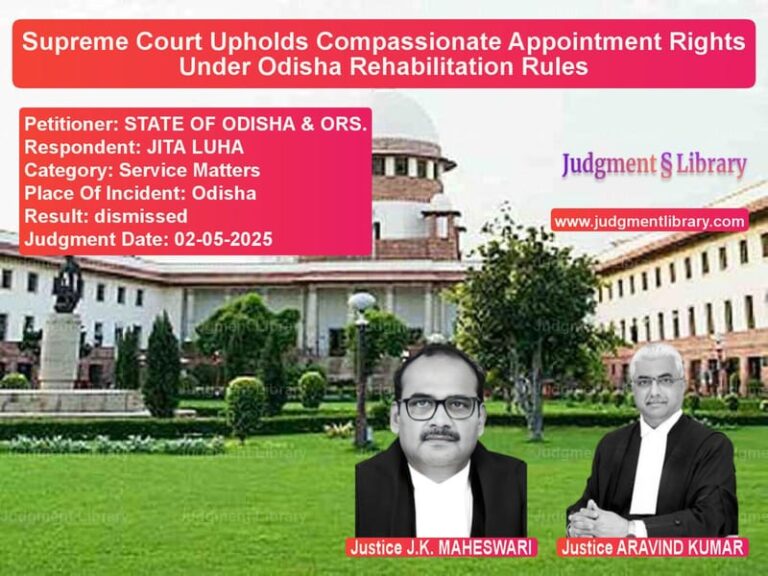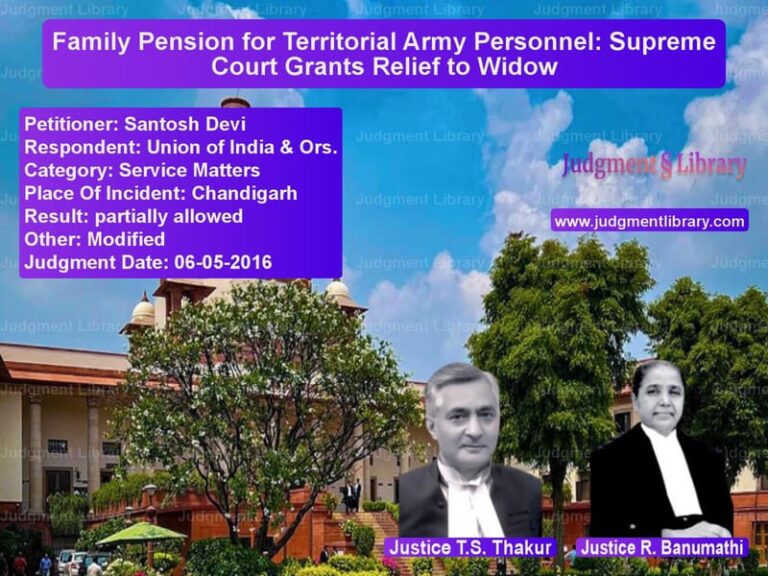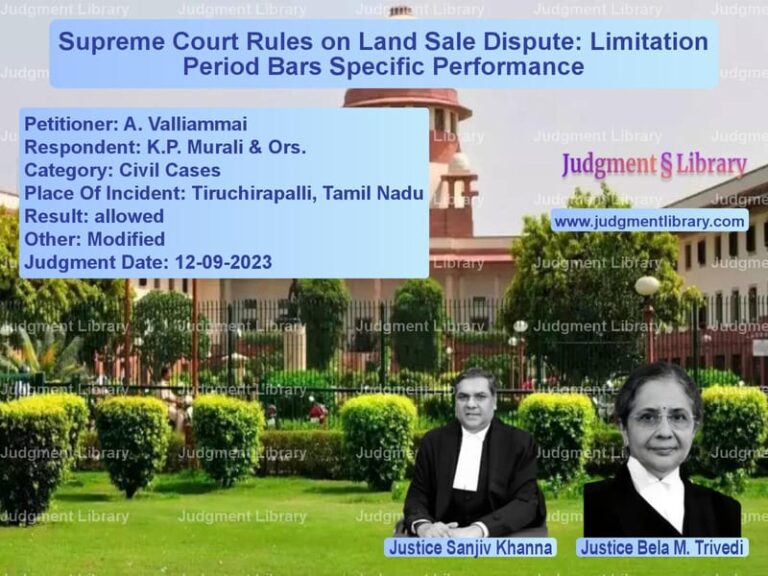Supreme Court Upholds Employee’s Right to Voluntary Retirement: Indian Bank vs. Mahaveer Khariwal
The Supreme Court of India, in the case of Indian Bank & Anr. vs. Mahaveer Khariwal, addressed a significant employment law issue regarding the rejection of an employee’s voluntary retirement application. The Court upheld the right of the employee to retire voluntarily under Regulation 29 of the Indian Bank Employees Pension Regulations, 1995, dismissing the appeal filed by the employer-bank. This judgment reinforces employee rights and clarifies the legal interpretation of voluntary retirement policies.
Background of the Case
Mahaveer Khariwal, the respondent, was a Chief Manager at Indian Bank, posted at its Colombo branch. After being transferred back to India and posted at Defence Colony Branch, New Delhi, he applied for voluntary retirement on 21st January 2004, citing personal reasons. His application sought waiver of the three-month notice period, and he authorized the bank to deduct the salary for the notice period from his retirement benefits.
The bank, through a letter dated 20th April 2004, rejected his voluntary retirement request, stating that he was not eligible under the Pension Regulations, 1995. Aggrieved by this, the respondent approached the Delhi High Court, challenging the rejection.
Legal Proceedings
- The Single Judge of the High Court dismissed his plea regarding the voluntary retirement rejection but granted him certain service benefits related to travel and educational expenses.
- Upon appeal, the Division Bench of the High Court overturned the Single Judge’s decision, holding that the bank’s rejection of the voluntary retirement request was illegal. The Court directed the bank to process and release his retiral dues under the Pension Regulations, 1995.
- Indian Bank then challenged the High Court’s ruling in the Supreme Court.
Legal Issues Raised
- Whether the bank had the authority to reject the voluntary retirement application under Regulation 29 of the Pension Regulations, 1995.
- Whether the rejection of the request was legally valid.
- Whether the employee was entitled to retiral benefits under the pension regulations.
Petitioner’s (Indian Bank) Arguments
- The bank argued that voluntary retirement applications require acceptance by the appointing authority and cannot be unilaterally enforced.
- As per Regulation 29(1), an employee must serve for at least one year in India after returning from an overseas posting to be eligible for voluntary retirement. The respondent did not fulfill this requirement.
- The rejection letter was issued within three months of the application, meaning there was no deemed acceptance of voluntary retirement.
- The waiver of the three-month notice period was not automatic, and the employer had discretion to accept or reject such a request.
- Disciplinary proceedings had been initiated against the respondent for unauthorized absence, which further justified the rejection of his voluntary retirement.
Respondent’s (Mahaveer Khariwal) Arguments
- The employee argued that his voluntary retirement application was fully compliant with Regulation 29.
- His request for waiver of the notice period was valid, and the bank had no legal ground to reject it.
- The bank’s rejection letter did not cite any valid reason for refusal but merely stated that he was “not eligible” under the pension regulations.
- The Division Bench of the High Court correctly ruled in his favor by holding that the rejection was arbitrary.
- The rejection letter was served on him only after the expiry of the notice period, which amounted to deemed acceptance.
Supreme Court’s Observations
The Supreme Court extensively analyzed Regulation 29 of the Pension Regulations, 1995, which governs voluntary retirement for bank employees. It held:
“An employee who has completed 20 years of qualifying service is entitled to seek voluntary retirement by giving a three-month notice to the appointing authority. If the appointing authority does not reject the application before the expiry of the notice period, the retirement becomes effective.”
The Court further noted:
“In the present case, the bank’s rejection letter dated 20.04.2004 does not provide any cogent reason for refusal. The rejection is merely declaratory and does not consider the request on its merits.”
Regarding the eligibility criteria, the Court observed:
“The requirement of serving in India for one year after an overseas posting applies only to employees on deputation. In this case, the respondent was not on deputation but was transferred, and therefore, the bank’s reasoning is flawed.”
The Court also rejected the bank’s argument regarding pending disciplinary proceedings:
“The disciplinary proceedings initiated against the employee post facto cannot be a valid ground for rejecting voluntary retirement, especially when such proceedings were not even mentioned in the rejection letter.”
Final Judgment
- The Supreme Court dismissed Indian Bank’s appeal and upheld the High Court’s ruling.
- It directed the bank to process and release the respondent’s retiral benefits, including pension, as per the Pension Regulations, 1995.
- The Court held that voluntary retirement applications cannot be arbitrarily rejected without providing valid and legally sustainable reasons.
- The judgment reinforced that employment regulations must be interpreted in favor of employees when there is ambiguity.
Implications of the Judgment
The ruling has significant implications for employment law and the banking sector:
- Strengthening Employee Rights: The judgment affirms that employees have the right to seek voluntary retirement under the prescribed rules and that employers cannot arbitrarily reject their requests.
- Regulation 29 Interpretation: The Supreme Court’s interpretation clarifies that serving in India for one year after an overseas posting is applicable only in cases of deputation, not regular transfers.
- Deemed Acceptance Principle: If an employer does not reject a voluntary retirement request within the notice period, it will be deemed to be accepted.
- Employer’s Discretion Limited: While employers can evaluate voluntary retirement requests, they must provide a valid reason if they choose to reject them.
Conclusion
The Supreme Court’s ruling in Indian Bank vs. Mahaveer Khariwal sets a crucial precedent for voluntary retirement policies. It ensures that banks and other public sector organizations cannot arbitrarily reject voluntary retirement applications without providing legitimate reasons. This decision strengthens employee protections and reinforces fairness in employment-related legal disputes.
Petitioner Name: Indian Bank & Anr..Respondent Name: Mahaveer Khariwal.Judgment By: Justice Ashok Bhushan, Justice R. Subhash Reddy, Justice M.R. Shah.Place Of Incident: New Delhi, India.Judgment Date: 22-01-2021.
Don’t miss out on the full details! Download the complete judgment in PDF format below and gain valuable insights instantly!
Download Judgment: indian-bank-&-anr.-vs-mahaveer-khariwal-supreme-court-of-india-judgment-dated-22-01-2021.pdf
Directly Download Judgment: Directly download this Judgment
See all petitions in Pension and Gratuity
See all petitions in Public Sector Employees
See all petitions in Termination Cases
See all petitions in Judgment by Ashok Bhushan
See all petitions in Judgment by R. Subhash Reddy
See all petitions in Judgment by Mukeshkumar Rasikbhai Shah
See all petitions in dismissed
See all petitions in Quashed
See all petitions in supreme court of India judgments January 2021
See all petitions in 2021 judgments
See all posts in Service Matters Category
See all allowed petitions in Service Matters Category
See all Dismissed petitions in Service Matters Category
See all partially allowed petitions in Service Matters Category







